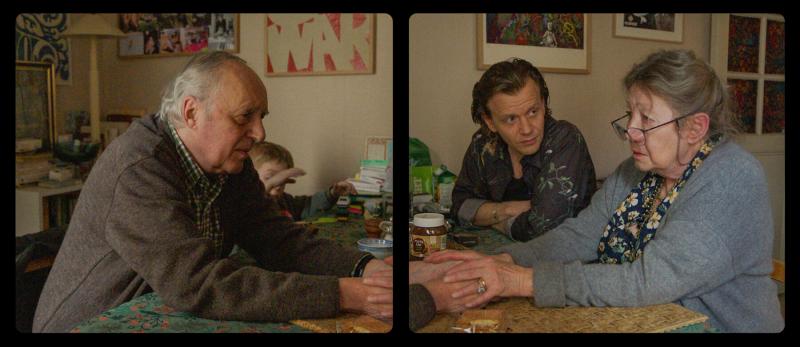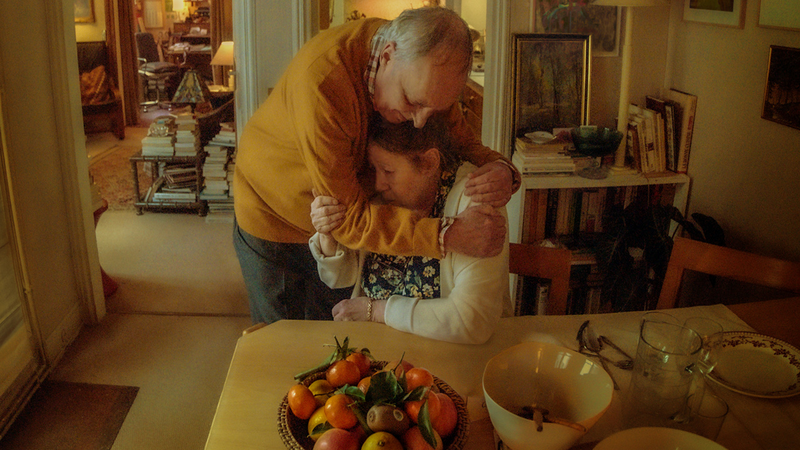Vortex review – an old couple's road to nowhere | reviews, news & interviews
Vortex review – an old couple's road to nowhere
Vortex review – an old couple's road to nowhere
Gaspar Noé's unflinching depiction of dementia's merciless grip

Life, opined Thomas Hobbes, is “nasty, brutish, and short”. In Gaspar Noé’s Vortex it’s not short enough for a dementia-afflicted octogenarian psychiatrist (Françoise Lebrun) and her addled film critic husband (giallo auteur Dario Argento), whose joint decline is a protracted saga of alienation, confusion, and fear.
When worrying is your default mode and oblivion your near future, dignity is an out-of-reach luxury and survival a harrowing moment-to-moment ordeal. As blunt as ever about human flaws and vulnerabilities, the Argentina-born French filmmaker Nóe typically offers no bromides or balm: he simply presents dementia as a biological fait accompli that most will have to confront at some point, as a sufferer, caregiver, or both. We should be aware, the film says, that it’s followed by effacement.
Documentary-like in its observation, Vortex is only implicitly sympathetic, as prompted by Noé’s personal losses: of his mother (from dementia) in 2012 and more recently his father-in-law, his mentor the Argentinian director Fernando Solanas, and the actor Phillipe Nahon, who played the butcher character in Noé’s Carne (1991), I Stand Alone (1998) and Irréversible (2002). There's a richness and maturity in Vortex that’s absent from the violent, sexually explicit provocations that are Noé's stock in trade. Tenderness, too.
The unnamed wife and husband are first seen toasting their togetherness with wine on their terrace on a balmy evening; it’s effectively their last moment as a couple. As the wife’s disassociation emerges and escalates, Noé splits the screen, dropping a bold black line down the middle of it “to emphasise their loneliness”, he has stated. The film was shot with two cameras, one focused on the wife and the other on the husband. The images frequently overlap, the couple maintaining their physical proximity as their intellectual interaction diminishes. (Pictured below: Dario Argento, Françoise Lebrun)
This is both poignant and inherently disturbing: it would seem to augur the day when the husband finds himself married to a husk, but events overcome the couple before that occurs. Noé takes his dementia film in a different direction than that followed by Richard Eyre’s Iris (2001) or Michael Haneke’s Amour (2012), for example, his ironic manipulation of the narrative possibly informed by a sense of moral justice favouring the wife.
Vortex is less about the disease than the inability of spouses and grown children to overcome the unconquerable enemy in their midst. Noé thus puts a metaphoric arm around the shoulders of the husband and the couple’s son, Stéphane (Alex Lutz, also a director). Does he then remove his arm when it’s revealed that the husband is trying to reconnect with his former mistress and that Stéphane, who has a young son, is a heroin addict? It’s unclear. Noé has said Vortex is less Manichean than his other films, but it contains a hint of Hobbesian contempt for human nature.
Apart from an unannounced foray to a shop that sends her husband scurrying after her, the wife mostly potters around the couple’s flat. She frets about this and that, leaves the gas on, and, perhaps seeking order, perhaps revenging herself on her husband, albeit unconsciously, destroys something dear to him. To say Lebrun, hitherto best known for her performance in Jean Eustache’s The Mother and the Whore (1973), is convincing is inadequate; to exert such control playing a person losing herself, emptying out, is uncanny.
Argento’s perfomance is an equally affecting study in decay. As Vortex proceeds, Noé gradually reveals that the husband, who is writing a vaguely conceived book and still meets with his cronies, is also living in a fog. Asked by Stéphane how he is managing his wife’s treatment, the agitated husband says he has made lists of doctors, but there’s no indication he has. Evidently losing his grip on reality, he cuts a more pathetic figure than his wife, whose spells of lucidity are revelatory. The scenes showing Stéphane doling out drugs and drug paraphernalia to fellow junkies and being tempted into using again feel like a Noé-ish trope and slightly dilute his concentration on the parents. Nonetheless, Vortex is an unignorable howl of pain.
The future of Arts Journalism
You can stop theartsdesk.com closing!
We urgently need financing to survive. Our fundraising drive has thus far raised £49,000 but we need to reach £100,000 or we will be forced to close. Please contribute here: https://gofund.me/c3f6033d
And if you can forward this information to anyone who might assist, we’d be grateful.

Subscribe to theartsdesk.com
Thank you for continuing to read our work on theartsdesk.com. For unlimited access to every article in its entirety, including our archive of more than 15,000 pieces, we're asking for £5 per month or £40 per year. We feel it's a very good deal, and hope you do too.
To take a subscription now simply click here.
And if you're looking for that extra gift for a friend or family member, why not treat them to a theartsdesk.com gift subscription?
more Film
 After the Hunt review - muddled #MeToo provocation
Julia Roberts excels despite misfiring drama
After the Hunt review - muddled #MeToo provocation
Julia Roberts excels despite misfiring drama
 London Film Festival 2025 - Bradley Cooper channels John Bishop, the Boss goes to Nebraska, and a French pandemic
... not to mention Kristen Stewart's directing debut and a punchy prison drama
London Film Festival 2025 - Bradley Cooper channels John Bishop, the Boss goes to Nebraska, and a French pandemic
... not to mention Kristen Stewart's directing debut and a punchy prison drama
 Ballad of a Small Player review - Colin Farrell's all in as a gambler down on his luck
Conclave director Edward Berger swaps the Vatican for Asia's sin city
Ballad of a Small Player review - Colin Farrell's all in as a gambler down on his luck
Conclave director Edward Berger swaps the Vatican for Asia's sin city
 London Film Festival - from paranoia in Brazil and Iran, to light relief in New York and Tuscany
'Jay Kelly' disappoints, 'It Was Just an Accident' doesn't
London Film Festival - from paranoia in Brazil and Iran, to light relief in New York and Tuscany
'Jay Kelly' disappoints, 'It Was Just an Accident' doesn't
 Iron Ladies review - working-class heroines of the Miners' Strike
Documentary salutes the staunch women who fought Thatcher's pit closures
Iron Ladies review - working-class heroines of the Miners' Strike
Documentary salutes the staunch women who fought Thatcher's pit closures
 Blu-ray: The Man in the White Suit
Ealing Studios' prescient black comedy, as sharp as ever
Blu-ray: The Man in the White Suit
Ealing Studios' prescient black comedy, as sharp as ever
 The Woman in Cabin 10 review - Scandi noir meets Agatha Christie on a superyacht
Reason goes overboard on a seagoing mystery thriller
The Woman in Cabin 10 review - Scandi noir meets Agatha Christie on a superyacht
Reason goes overboard on a seagoing mystery thriller
 London Film Festival 2025 - crime, punishment, pop stars and shrinks
Daniel Craig investigates, Jodie Foster speaks French and Colin Farrell has a gambling habit
London Film Festival 2025 - crime, punishment, pop stars and shrinks
Daniel Craig investigates, Jodie Foster speaks French and Colin Farrell has a gambling habit
 I Swear review - taking stock of Tourette's
A sharp and moving tale of cuss-words and tics
I Swear review - taking stock of Tourette's
A sharp and moving tale of cuss-words and tics
 A House of Dynamite review - the final countdown
Kathryn Bigelow's cautionary tale sets the nuclear clock ticking again
A House of Dynamite review - the final countdown
Kathryn Bigelow's cautionary tale sets the nuclear clock ticking again
 theartsdesk Q&A: Idris Elba on playing a US President faced with a missile crisis in 'A House of Dynamite'
The star talks about Presidential decision-making when millions of lives are imperilled
theartsdesk Q&A: Idris Elba on playing a US President faced with a missile crisis in 'A House of Dynamite'
The star talks about Presidential decision-making when millions of lives are imperilled

Add comment